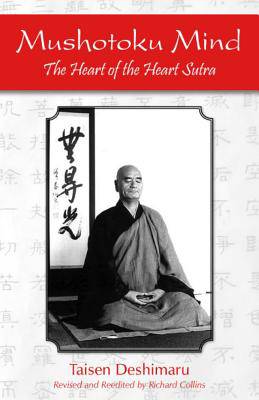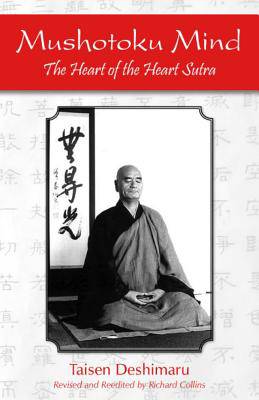
- Retrait gratuit dans votre magasin Club
- 7.000.000 titres dans notre catalogue
- Payer en toute sécurité
- Toujours un magasin près de chez vous
- Retrait gratuit dans votre magasin Club
- 7.000.0000 titres dans notre catalogue
- Payer en toute sécurité
- Toujours un magasin près de chez vous
23,95 €
+ 47 points
Description
Mushotoku mind means an attitude of no profit, no gain. It is the core of Taisen Deshimaru's Zen. This respected master, the head of Japanese Soto Zen for all of Europe, moved from Japan in 1967 and brought this work to Paris, from where it was disseminated throughout the West. This book presents his brilliant commentary on the most renowned of Buddhist texts, the Heart Sutra, known in Japanese as Hannya Shingyo-a philosophical investigation on the futility of philosophical investigation.
Deshimaru's work fills a great gap in the interpretations of this seminal text in that he emphasizes "mind-emptiness" (ku) as the foundation of Zen practice, in contrast to the usual "mindfulness" focus of other Zen approaches. This "emptiness" and "purpose of no purpose" is one of the most difficult ideas for Westerners to understand. Yet we know that our most cherished values are based on mushotoku mind when it comes to love. We value the unselfish love of family or country that is based not on what we can get from the relationship but on what we can give. We know, too, that these virtues are not accomplished directly through our will but indirectly through dropping our expectations.
In his lectures on this subject, gathered here into one volume by translator and Zen teacher Richard Collins, Deshimaru returns to a chorus: Mushotoku mind is the key attitude characterizing the way of the Buddha, the way of the bodhisattva, the way of Zen and zazen, and the way of all sutras (teachings).
The written word has a checkered past in the history of Zen, which offers mind-to-mind transmission of wisdom without scripture and without words. Still, it is difficult to imagine Zen without its literature. Poems, koans, anecdotes, autobiographies, commentaries, sutras, all play a role in the transmission of Zen from the fifth century to the present. Ultimately, these written records can always be only fingers pointing at the moon of zazen.
Interpretations of the Heart Sutra abound, from as early as the T'ang dynasty. Deshimaru's contribution to this wealth is colored by his Japanese heritage, his knowledge of Western philosophy, the cross-fertilization received from Parisian students of the 1960-70s, and above all by the central place he gives to mushotoku, which Richard Collins translator calls "the heart of the Heart Sutra."
Deshimaru's work fills a great gap in the interpretations of this seminal text in that he emphasizes "mind-emptiness" (ku) as the foundation of Zen practice, in contrast to the usual "mindfulness" focus of other Zen approaches. This "emptiness" and "purpose of no purpose" is one of the most difficult ideas for Westerners to understand. Yet we know that our most cherished values are based on mushotoku mind when it comes to love. We value the unselfish love of family or country that is based not on what we can get from the relationship but on what we can give. We know, too, that these virtues are not accomplished directly through our will but indirectly through dropping our expectations.
In his lectures on this subject, gathered here into one volume by translator and Zen teacher Richard Collins, Deshimaru returns to a chorus: Mushotoku mind is the key attitude characterizing the way of the Buddha, the way of the bodhisattva, the way of Zen and zazen, and the way of all sutras (teachings).
The written word has a checkered past in the history of Zen, which offers mind-to-mind transmission of wisdom without scripture and without words. Still, it is difficult to imagine Zen without its literature. Poems, koans, anecdotes, autobiographies, commentaries, sutras, all play a role in the transmission of Zen from the fifth century to the present. Ultimately, these written records can always be only fingers pointing at the moon of zazen.
Interpretations of the Heart Sutra abound, from as early as the T'ang dynasty. Deshimaru's contribution to this wealth is colored by his Japanese heritage, his knowledge of Western philosophy, the cross-fertilization received from Parisian students of the 1960-70s, and above all by the central place he gives to mushotoku, which Richard Collins translator calls "the heart of the Heart Sutra."
Spécifications
Parties prenantes
- Auteur(s) :
- Traducteur(s):
- Editeur:
Contenu
- Nombre de pages :
- 176
- Langue:
- Anglais
Caractéristiques
- EAN:
- 9781935387275
- Date de parution :
- 01-11-12
- Format:
- Livre broché
- Format numérique:
- Trade paperback (VS)
- Dimensions :
- 140 mm x 213 mm
- Poids :
- 249 g

Les avis
Nous publions uniquement les avis qui respectent les conditions requises. Consultez nos conditions pour les avis.






